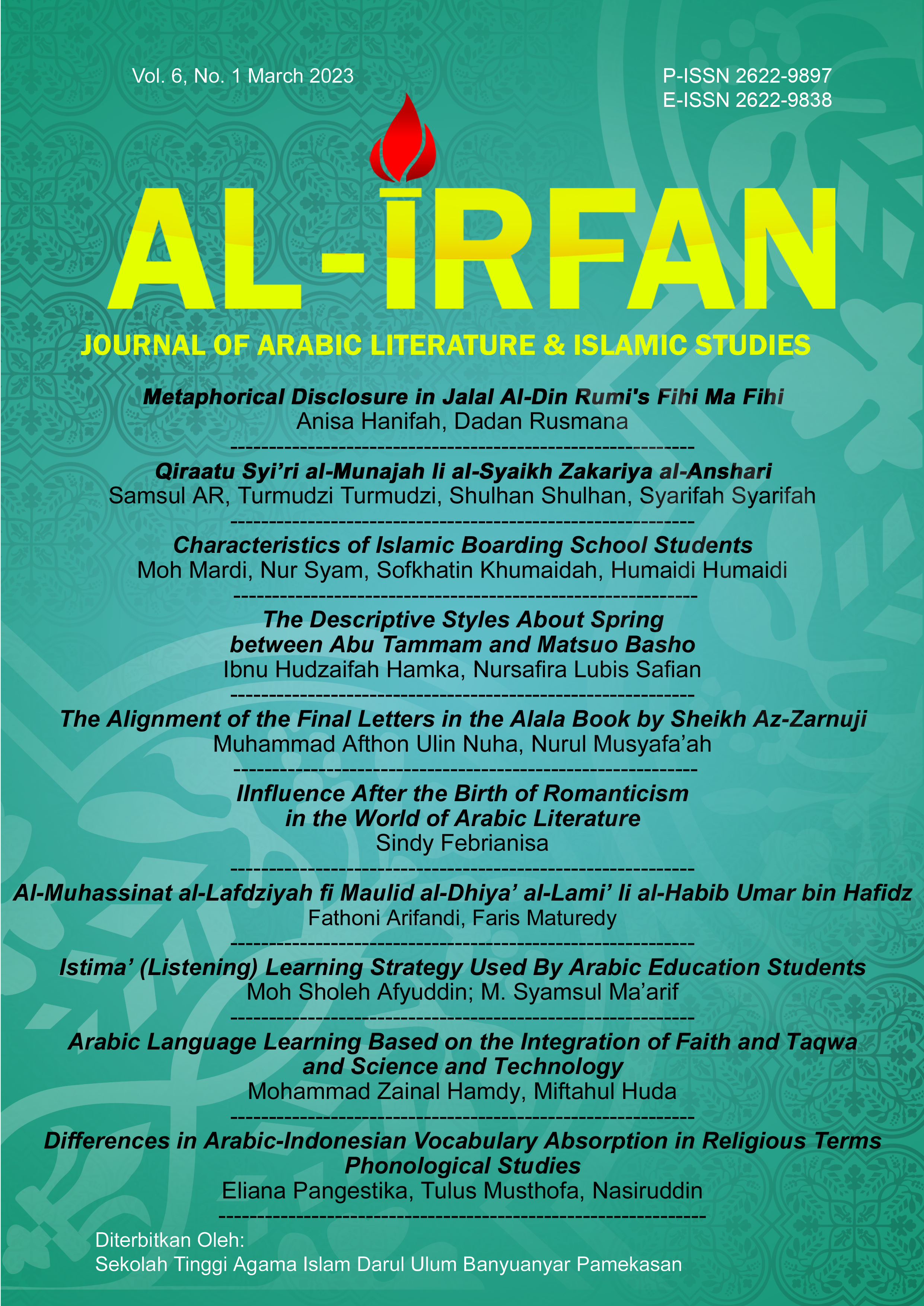Listening Learning Strategy Used by Arabic Education Students
DOI:
https://doi.org/10.58223/alirfan.v6i1.6617Keywords:
language learning strategy, listening strategy, cognitive, metacognitive, socio-affective, maharah istima'Abstract
This study aims to reveal the learning strategies that are reported more often used by Arabic language education students in studying maharah istima' and to elaborate on the practices to provide a comprehensive overview of how to learn istima'. This study is a mixed method with a sequential explanatory design, where the researcher takes quantitative data first, then explores it in more depth through qualitative data. The quantitative data taken through a questionnaire, adapted from O'Malley and Chamot, and Vandergrift's taxonomy of learning strategies, reported that cognitive learning strategies are used by 50.3%, metacognitive learning strategies are used by 39.1%, while socio-affective learning strategies are used by 44.5%. The qualitative data collected by follow-up interviews reported that the cognitive strategies used by students included inferencing, elaboration, imagery, translation, summarization, note-taking, and substitution. Inferencing, elaboration, imagery, and translation strategies are reported to be the most used, compared to summarization, note-taking, and substitution. Metacognitive strategies are reported to be used entirely, namely planning, monitoring, evaluation, and problem identification. Meanwhile, the socio-affective strategy was reported to be the least used of the three learning strategies and only used lowering anxiety, taking emotional temperature, and questioning for clarification.References
Abdullah, Abdulhamid, and Nasheer Abdullah Al Gholy. 1991. “Usus I’daad Al-Kutub Al-Ta’liimiyah Li Ghoiri Al-Nathiqiina Bi Al-Arabiyah.â€
Altuwairesh, Nasrin. 2016. “EFL Saudi Undergraduate Students’ Use of Metacognitive Listening Strategies.†Arab World English Journal 7 (1): 78–93. https://doi.org/10.24093/awej/vol7no1.6.
Asrori, Imam. 2014. Strategi Belajar Bahasa Arab. Malang: Misykat Indonesia.
Bao, Dat, and Cheng Guan. 2019. “Listening Strategies.†The TESOL Encyclopedia of English Language Teaching, no. January 2019: 1–6. https://doi.org/10.1002/9781118784235.eelt0588.
Barnwell, David, J. Michael O’Malley, and Anna Uhl Chamot. 1991. “Learning Strategies in Second Language Acquisition.†Language 67 (2): 416. https://doi.org/10.2307/415153.
Chamot, Ana Uhl, and Others. 1987. “A Study of Learning Strategies in Foreign Language Instruction. First Year Report.†https://eric.ed.gov/?id=ED352824.
Fedderholdt, Karen. 1998. “Using Diaries to Develop Language Learning Strategies.†JALT Publication. 1998. https://jalt-publications.org/tlt/articles/2282-using-diaries-develop-language-learning-strategies.
Hamzah B. Uno. 2011. Teori Motivasi Dan Pengukurannya. Jakarta: Bumi Aksara.
Iskandarwassid, and Dadang Sunendar. 2011. Strategi Pembelajaran Bahasa. Bandung: PT. Ramaja Rosdakarya.
Liu, Jing. 2010. “Language Learning Strategies and Its Training Model.†International Education Studies 3 (3): 100–104. https://doi.org/10.5539/ies.v3n3p100.
Muhidin, Aeng. 2017. Statistika Pendidikan: Pendekatan Berbasis Kinerja. Edited by Saiful Anwar. 1st ed. Banten: Unpam Press.
Rahimi, Mehrak, and Maral Katal. 2012. “Metacognitive Listening Strategies Awareness in Learning English as Aforeign Language: A Comparison between University and High-School Students.†Procedia - Social and Behavioral Sciences 31 (2011): 82–89. https://doi.org/10.1016/j.sbspro.2011.12.020.
Song, Wang. 2016. “Listening Comprehension Strategies Used By EFL Postgraduate Students.†University of Malaya.
Stanchina, Carolyn Henner. 1987. “Autonomy as Metacognitive Awareness: Suggestions for Training Self-Monitoring of Listening Comprehension.†Melanges Pedagogiques, 69–84. https://www.atilf.fr/wp-content/uploads/publications/MelangesCrapel/file-17-6-1.pdf.
Sugiyono. 2017. Metode Penelitian Kombinasi (Mixed Method). Bandung: Alfabeta.
Tarigan, Henry Guntur. 2008. Menyimak Sebagai Suatu Keterampilan Berbahasa. Ed. Revisi. Bandung: Angkasa.
Vandergrift, Larry. 2003. “Orchestrating Strategy Use: Towards a Model of the Skilled L2 Listener.†Language Learning 53 (September): 461–94.
Vandergrift, Larry, and Marzieh H. Tafaghodtari. 2010. “Teaching L2 Learners How to Listen Does Make a Difference: An Empirical Study.†Language Learning 60 (2): 470–97. https://doi.org/10.1111/j.1467-9922.2009.00559.x.
Vandergrift, Laurens. 1997. “The Comprehension Strategies of Second Language (French) Listeners: A Descriptive Study.†Foreign Language Annals 30 (3): 387–409. https://doi.org/10.1111/j.1944-9720.1997.tb02362.x.
Wekke, Ismail Suardi. 2014. Model Pembelajaran Bahasa Arab. Ed. 1, Cet. Yogyakarta: Deepublish. https://books.google.co.id/books?id=ManiCQAAQBAJ&lpg=PR6&ots=74-DDtbeKw&dq=praktik bahasa arab&lr&hl=id&pg=PR5#v=onepage&q=praktik bahasa arab&f=false.
Zarkasyi, Ahmad Hidayatullah, Gita Hanina, and Siti Anne Barkah Nur Fauziah. 2022. “Teaching Aids Development for Arabic Lessons to Enhance Student’s Reading Skills.†Arabiyat : Jurnal Pendidikan Bahasa Arab Dan Kebahasaaraban 9 (1): 124–36. https://doi.org/10.15408/a.v9i1.25496.
بن سعدون, مهدي, and أمينة لكØÙ„. 2022. “الممارسة اللغوية وأثرها ÙÙŠ تنمية المهارات اللغوية -السنة الثانية ابتدائي نموذجا-,†July. http://dspace.univ-tiaret.dz:80/handle/123456789/2247.
Downloads
Published
How to Cite
Issue
Section
License
Copyright (c) 2023 Moh Sholeh Afyuddin, M. Syamsul Ma'arif

This work is licensed under a Creative Commons Attribution 4.0 International License.
Lisensi :
Al-Irfan: Journal of Arabic Literature and Islamic Studies is published under conditions Creative Commons Attribution 4.0 International License / CC BY 4.0 This license permits anyone to copy and redistribute this material in any form or format, modify, modify, and make derivative works of this material for any purpose, including commercial purposes, so long as they credit the author for the original work.











